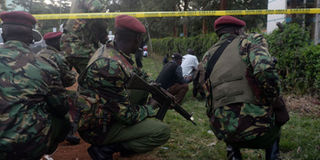Terrified civilians hide, send farewells, during Nairobi siege

What you need to know:
The attack on Dusit complex was claimed by the Al-Qaeda-linked Somali group Al-Shabaab, which has targeted Kenya since it sent its army into Somalia in October 2011 to fight the jihadist group
Nairobi. When an explosion and gunfire rang out at an upmarket hotel complex in Nairobi, people hid under desks, cowered in bathrooms or hunkered down in their cars, some of them all through the 20-hour siege.
Here are some of the stories from survivors of the attack claimed by the Somali Islamist group Al-Shabaab on an upmarket hotel complex in the Westlands district of the Kenyan capital.
Saying goodbye
"Please tell my family I love them," 38-year-old Ronald Ng'eno wrote on Twitter in what he believed was his final goodbye.
Ng'eno, who was rescued after 11 hours in hiding, told AFP he was in his office where he worked as a communications officer for the Commission on Revenue Allocation when he heard "a massive blast followed by unending gunshots".
He and his colleagues tried to flee but quickly realised the gunmen were already inside.
"They started firing directly towards us and that was when we changed course and ran into the bathrooms located on first floor. Upon entering the bathroom I saw a small opening on the ceiling and that's where I hid momentarily."
First he sent a tweet to police to ask for help.
"But as the gunshots continued to grow louder and louder my hope of seeing my family again faded by the minute and that is when I decided to tweet my last message to my wife and two sons," he said.
"If I die I love the Lord and believe I will go to heaven please tell my family I love them. I love you Caleb, Mark and Carol," Ng'eno's tweet read.
After a while he climbed down from the ceiling to join about six others also hiding in the bathroom.
He continued to communicate with the police until his battery died at around 11 pm, when the siege was still going on.
"Luckily, police had told that they would knock on the door in a specific way so as to identify themselves and at 2.30 am on Wednesday we heard the knock and we knew help had finally come."
Saved by a flat battery
Brian Gatimu, a tour operator based inside the sprawling office park, which includes a luxury hotel and restaurants, credits his car's battery dying for his survival.
"I had left the lights on. Talk of God's doings," Gatimu told Capital FM News.
He said he was leaving his office and was delayed in the rooftop parking lot as he looked for someone to help him jumpstart his car.
Two minutes after his car's engine was ready, he heard a loud bang. "I saw huge smoke billowing from the entrance." He said he hid in his car for two hours, calling for help on Twitter, before police officers came to rescue him.
"My car is tinted. I stayed inside hoping all is well. I was shaken," he said.
Barista to the attackers
Reuben Kimani, a barista working at the hotel, said he recognised at least one of the attackers, having served him coffee in the run-up to the assault.
"I knew one of them because he had a big scar on one of his hands," he said. "I saw them. They shot six of my friends, four didn't die but two succumbed."
He said the attackers yelled out "why are you killing our brothers and sisters in Somalia?" before opening fire.
He was rescued after several hours trapped inside the hotel.
'Every man for himself'
Cyprian Otieno, a 23-year-old student, met a friend for lunch elsewhere in Westlands, and then decided to go to the Dusit where his friend wanted to grab a cocktail.
"All of a sudden we heard a weird BOOM followed by gunfire! Security guards at the entrance screamed 'get back, get back' in English and Swahili," he told AFP via Twitter.
He said some fled while others tried to hide, waiting about half an hour until they heard a voice shouting "kill them, kill them" in Swahili and more gunfire.
Terrified a group of about 20 people fled towards the back of the hotel.
"Sorry to say at that point it was every man for himself. We were all together in the beginning but after a few minutes the attackers began shooting... I can't even really remember what happened afterwards." (AFP)




